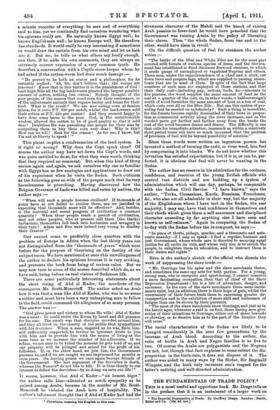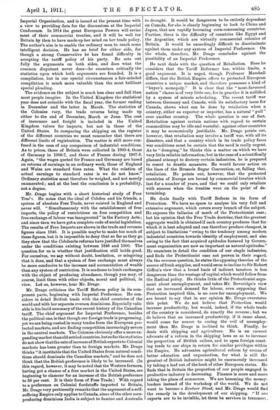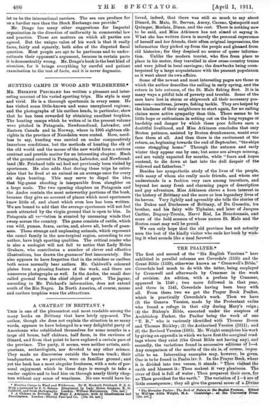THE FUNDAMENTALS OF TRADE POLICY.* THIS is a most useful
and opportune book. Mr. Drage tells us in the preface that it is an instalment of a larger work on • Th. Imperil Organisation of Trade. By Geoffrey Drage. London : Smith, Elder and Co. [10s. 6d. net.]
Imperial Organisation, and is issued at the present time with a view to providing data for the discussions at the Imperial Conference. In 1914 the great European Powers will revise most of their commercial treaties, and it will be well for Britain by then to have made up her mind on her trade policy. The author's aim is to enable the ordinary man to reach some intelligent decision. He has no brief for either side, for though a strong Conservative he has found difficulty in accepting the tariff policy of his party. He sets out fully the arguments on both sides, and does what the common disputant never does—he examines critically the statistics upon which both arguments are founded. It is a compilation, but in our special circumstances a fair-minded compilation is much more valuable than the most brilliant special pleading.
The evidence on the subject is much less clear and full than most people imagine. In the United Kingdom the statistical year does not coincide with the fiscal year, the former ending in December and the latter in March. The statistics of the Colonies vary, the trade returns being made up either to the end of December, March or June. The cost of insurance and freight is included in the United Kingdom values for imports, but not in those of the United States. In comparing the shipping on the register of the different countries we must remember that there are different limits of registration. The matter is still more con- fused in the case of any comparison of industrial conditions. As to prices, those of Britain were collected in 1903-4, those of Germany in 1906-7, and those of France during 1907-8. Again, "the wages quoted for France and Germany are based on returns of earnings in an ordinary week, those of England and Wales are standard time rates. What the relation of actual earnings to standard rates is we do not know." Ordinary statistics must therefore be weighed, and not merely enumerated ; and at the best the conclusion is a probability, not a dogma.
Mr. Drage begins with a short historical study of Free Tra?% He notes that the ideal of Cobden and his friends, a system of absolute Free Trade, never existed in England and never will. " Simultaneously with the establishment of free imports, the policy of restrictions on free competition and free exchange of labour was inaugurated" in the Factory Acts; and since then we have got a complete code of social legislation. The results of Free Imports are shown in the trade and revenue figures since 1846. It is possible maybe to make too much of these figures, but it is impossible to deny that so far as they go they show that the Cobdenite reforms have justified themselves under the conditions existing between 1846 and 1900. The question for us is whether that justification still holds good. For ourselves, we say without doubt, hesitation, or misgiving that it does, and that a system of free exchange must always be more conducive to the increase and accumulation of wealth than any system of restriction. It is madness to limit exchanges with the object of producing abundance, though you may, of course, limit them with other objects, moral and political, in view. Let us, however, hear Mr. Drage.
Mr. Drage criticises the Tariff Reform policy in its com- ponent parts, beginning with Imperial Preference. He con- siders in detail British trade with the chief countries of the world and with her separate oversee dominions. Especially valu- able is his lucid summary of the recent history of the Canadian tariff. The chief argument for Imperial Preference, besides the political one, is that though our foreign trade is progressing, yet we are being ousted in many trades from the European pro- tected markets, and are finding competition increasingly severe in the neutral markets. The Colonies obviously offer a more ex- panding market than old settled countries, butso far the statistics do not show that the rate of increase of British exports to Colonial markets has been greater than to foreign markets. Mr. Drage thinks "it inevitable that the United States from natural condi- tions should dominate the Canadian markets," and he does not think that the British preference is likely to be increased. (In this regard, however, it may be noted that the Western farmers, having got a chance of a free market in the United States, are beginning to clamour for an increase of the British preference to 50 per cent. It is their form of Free Trade.) With regard to a preference on Colonial foodstuffs imported to Britain, Mr. Drage very pertinently remarks that the argument of a self- sufficing Empire only applies to Canada, since of the other corn- producing dominions India is subject to famine and Australia to drought. It would be dangerous to be entirely dependent on Canada, for she is clearly beginning to look to China and Japan, that are rapidly becoming corn-consuming countries. Further, there is the difficulty of countries like Egypt and the Argentine, which are virtually commercial colonies of Britain. It would be exceedingly difficult to discriminate against them under any system of Imperial Preference. On the whole, therefore, Mr. Drage concludes against the possibility of an Imperial Preference.
He next deals with the question of Retaliation. Here he considers that the Tariff Reformer has, within limits, a good argument. It is urged, though Professor Marshall differs, that the British Empire offers to protected European countries a unique market, and therefore possesses a kind of "buyer's monopoly." It is clear that the "most-favoured nation " clause is of very little use, for in practice it is nullified by a system of minute scheduling. The recent tariff war between Germany and Canada, with its satisfactory issue for Canada, shows what can be done by retaliation when a country, either as exporter or importer, has a natural " pull " over another country. The whole question is one of fact. Retaliation against certain nations with regard to certain commodities may be idle and wasteful : against other countries it may be economically justifiable. Mr. Drage points out, however, that retaliation may involve a tariff war, with all its disasters, and that a country which in its trade policy faces war conditions must be certain that the need is really urgent. As to " dumping," he thinks this a matter on which we have very little reliable information; but in the case of a scientifically planned attempt to destroy certain industries, he is prepared to resort to drastic measures. He would favour action on the lines of the Brussels Sugar Convention, or, failing that, retaliation. He points out, however, that the protected countries of Europe are bound by commercial treaties which last for a number of years, and that we could only retaliate with success when the treaties were on the point of de- termining.
He deals finally with Tariff Reform in its form of Protection. We have no space to analyse his very full and extensive argument, which covers every branch of the subject. He exposes the fallacies of much of the Protectionist case; but his opinion that the Free Trade doctrine, that the greatest aggregate wealth is obtained if each country produces that for which it is best adapted and can therefore produce cheapest, is subject to limitations "owing to the tendency among modern industrial countries towards identity of employment, and also owing to the fact that acquired aptitudes fostered by Govern- ment organisation are now as important as natural aptitudes." He examines in detail the condition of our staple industries, and finds the Protectionist case not proven in their regard. On the revenue question, he states the opposing theories of the source of fresh supplies, and would seem to incline to Sir Robert Giffen's view that a broad basis of indirect taxation is less dangerous than the wastage of capital which would follow from the Radical policy. He thinks little of the Protectionist argu- ment about unemployment, and takes Mr. Beveridge's view that an increased demand for labour, even supposing that Protection inspired this, is no cure for unemployment. We are bound to say that in our opinion Mr. Drage overstates this point. We do not believe that Protection would increase productivity, but would, indeed, if the whole trade of the country is considered, do exactly the reverse ; but we do believe that an increased productivity, if it came about, would come far nearer to curing the evil of unemploy- ment than Mr. Drage is inclined to think. Finally, he deals with shipping and agriculture. He is an earnest advocate of a reform in the shipping laws so as to increase the proportion of British sailors, and to open foreign coast- ing trade to our ships in return for similar privileges within the Empire. He advocates agricultural reform by means of better education and organisation, for what is still the greatest of British industries might be enormously increased by taking a leaf out of the book of other European states. He finds that in Britain the proportion of our people engaged in productive industry is decreasing. Finance is more and more taking the place of eommerce. We are becoming the money- lenders instead of the workshop of the world. We do not want to become a Ile-saner Staat, and Mr. Drage would find the remedy in the development of our shipping. " If our exports are to be invisible, let them be services in transport
let us be the international carriers. The sea can produce for us a hardier race than the Stock Exchange can provide."
Mr. Drage has many other suggestions for Imperial organisation in the direction of uniformity in commercial law and practice. These are matters on which all parties are agreed. But the unique value of his work is that it really faces, fairly and squarely, both sides of the disputed fiscal question. Most people are apt to be partisans and to under- estimate their opponent's argument, because in certain parts it is demonstrably wrong. Mr. Drage's book is the best kind of eirenicon, for it brings everything by careful and patient examination to the test of facts, and it is never dogmatic.












































 Previous page
Previous page